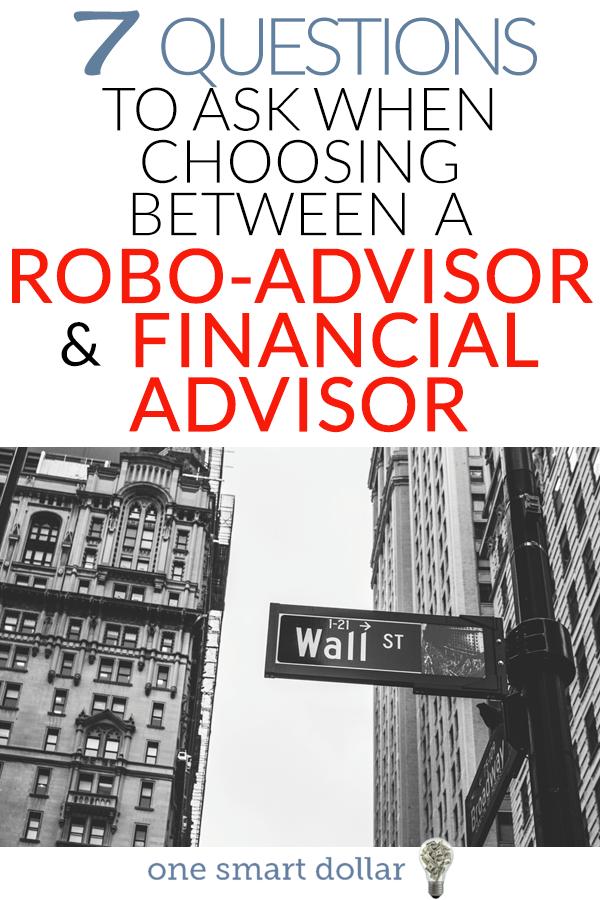
The rise of the machines is upon us, as automated “robo-advisors” absorb an increasing share of the retail investing market. Their pitch is simple: robots are logical and disciplined decision makers that don’t require a salary and don’t worry about their commissions. Their computing power allows them to provide sophisticated features like automated rebalancing, tax-loss harvesting, and index tracking in a fraction of the time as human advisors, opening up these once costly services to lower net worth investors.
Others note that robo-advisors sacrifice both the comprehensive and customized financial support of a human advisor and investment flexibility in pursuit of lower fees. Investors should start with the following questions when deciding which track is the best for them.
How much are you willing to shell out for money advice?
While some investors believe “you get what you pay for,” others cringe at the idea of writing a fat check for money management – especially in a bad year. Most financial advisors charge annual fees ranging between 1% and 3% of assets under management. With typical fees at robo-advisors ranging between 0.15% and 0.50% and with some “free” options, this is where automated investments truly shine.
Do you think money managers have any clue what’s going on?
Are you a passivist? The recent explosion in passive (index) investing corresponds with mounting evidence and expert opinion indicating that money managers cannot consistently beat the market. Those paying an advisor a premium for higher returns will often be disappointed.
However, also consider that financial advisors are not just hired to maximize return – they select investments that correspond with your individual financial situation. In addition, they aid with everything from budgeting to robust estate planning. The value you place on this mix of services is key to deciding where to place your money.
Have you checked how much fees will affect your retirement?
An analysis by NerdWallet indicates that while a 0.25% fee would reduce the value of your investment by nearly 7% over a typical 40-year saving window, a 1% fee shrinks your account by a whopping 25%. Of course, this is assuming both funds would earn the same rate of return, but with 86% of managers failing to beat their benchmarks last year, this is not an unreasonable assumption. Because of the nature of compounding returns, a change of even a fraction of a percentage point could cost hundreds of thousands of dollars in retirement.
Does managing your money online make you sweat or smile?
While many investors – especially millennials – appreciate the convenience and accessibility online investing brings, others are troubled by security concerns and the lack of human interaction. If you value the ability to call someone for financial advice or if managing money on an app makes you squeamish, a robo-advisor is probably not for you.
Are you investing money in heaps or handfuls?
Many financial advisors have account minimums from $200,000 to over $1,000,000, making them out-of-reach for most investors. Betterment, Wealthfront, and Schwab Intelligent Portfolios have account minimums of $0, $500, and $5,000 respectively, making them obvious choices for investors with fewer funds.
Larger accounts also have more investment choices and more sophisticated servicing needs like estate planning and tax mitigation. Many asset classes and more complex management options are unavailable on automated robo-advisor platforms.
Are you a financial guru or an investing rookie?
This can point you in either direction. Robo-advising can be great for novice investors as it makes virtually all decisions after the account is funded, meaning very little financial knowledge is required. However, new investors may not be adequately equipped to determine their likely needs in retirement or identify their appropriate risk profile using online tools alone. For this untrained investor, the guidance of a human advisor would prove helpful.
Similarly, an advanced investor may not see the need for basic financial advice but would likely feel constrained by the limited and automated nature of investing with a robo-advisor. Such an investor might rely on a financial advisor for support with complex investments and decisions or completely self-manage his/her portfolio.
Are you a control freak or financial free spirit?
With most robo-advisors, after answering a few questions about your age, goals, and risk tolerance, you are invested in a portfolio automatically built by the company’s algorithm. For the person who only cares to invest in index funds and desires a relatively hands-off relationship with his/her finances, automated platforms are a great choice. However, if you want to individually choose securities, exclude certain asset classes, or manually adjust your holdings, you should steer clear of robo-advisors.
Wrapping Up
Each investor must make a decision based on a variety of factors and preferences. Younger investors with smaller accounts and relatively basic financial needs are well-suited by the lower fee structure offered by robo-advisors. Those with a higher net worth, more sophisticated investing preferences, or a desire for hands-on management would be more comfortable choosing a traditional financial advisor. A complete takeover of advising by robots has been averted – for now.

